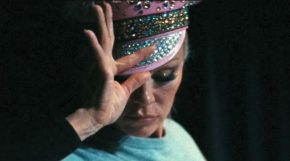Article: Győző Nagy
Translation: Nóra Fehér
For genuine music, the borders are just jagged lines drawn in red ink on a map. Crisscrosses that have nothing to do with the reality of things. Another proof of the above thesis is just a few days away: on Thursday evening, Azeri-born Alim Qasimov and Persian Alireza Ghorbani will be giving a joint testimony to the universality of culture. Don’t be alarmed, of course: the proof is not in a textbook sermon or a collection of diagrams on the wall with an overhead projector, but in a performance by musicians in the flesh and living legends. Drawing on the teachings of Sufism from the time of the prophet Muhammad, these two great and much-seen performers will take their listeners to the ancient East, paying homage to Persian (Rűmî) and Azeri (Fuzűlî) poetry – and bring them back to the present on the wings of music.

“To be a musician, you must have a true fire burning inside you”
– says Alim Qasimov, preparing for his first concert in Hungary. And he must know this, for the young man, who has been drawn to the mugham since his early childhood as the result of a runaway girl, has imagined a very different life for himself, a genre rooted in prayers and lullabies that have been inscribed on the unesco World Intangible Cultural Heritage list and that go back to time immemorial. But at the age of nineteen, he decided that he would rather lose his job as a chauffeur (and the secure livelihood that came with it) than his God-given talent, and so he turned to music. In the early days of his career he sang a lot at weddings (which required an incredibly wide repertoire), and today he is not only mentioned by a significant proportion of world music fans alongside his idol, the self-professed spirit liberator Nusrat Fateh Ali Khan, but also by Jeff Buckley and Björk.
Qasimov’s partner this evening will be Alireza Ghorbani from Iran. Qasimov and Ghorbani share a common ground in their art, which is not a daunting task, since, in addition to their socialisation in a Cold War environment (Qasimov was born into the Soviet system, his Iranian counterpart into the US-backed Shah’s), they are also linked by the fact that the mugham is essentially a blend of Turkish and persian traditions, shaped into its present-day version.
Comfortable in both small groups and full-blown orchestras, Ghorbani grew up in the turbulent Tehran of the 1970s and 1980s, but fortunately his adversity did not deter him from using his vocal talent for reciting the Qur’an to set the course of his life. The performer, who is now regarded as an outstanding master of the particularly difficult techniques of tasnif and radif singing, has already enjoyed overwhelming success in 2019, but his collaboration with Qasimov promises to be a transcendent experience.
Also because of what else the two venerable men have in common is that, although they both claim to be masters of traditional performance, they never hesitate to mix their music with non-traditional, contemporary, and, God forbid, other cultural influences.
Multiplying the catharsis of the meeting of past and present in Thursday’s concert is the use of ancient instruments such as the moshtagh, tar and kamancheh, and for the Hungarian listeners, two outstanding musicians from Hungary, András Dés, a percussionist long out of his father’s shadow, and his old “playing partner” Mihály Dresch, Elemér Balázs and Mátyás Szandai, a double bass player who has also played in Archie Shepp’s orchestra, will facilitate the connection.
Article: Győző Nagy
Translation: Nóra Fehér



























Comments